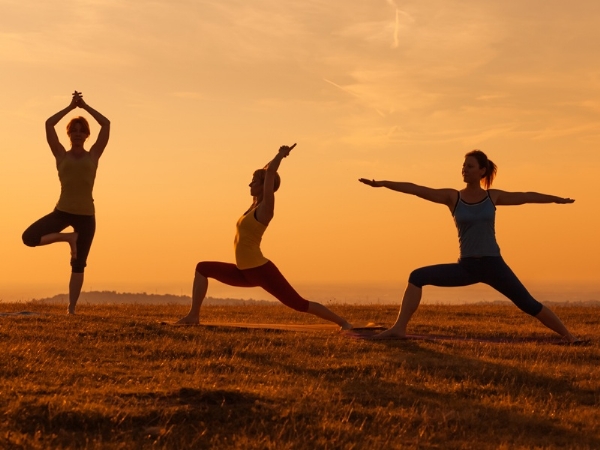Vishwaguru Bharat 2: Tracing the roots of Yoga & tracking its remarkable journey
10 Aug 2023 18:45:35
Yoga , an ancient practice that harmonizes the body, mind, and spirit, finds its origins in the diverse cultural and spiritual landscape of India. Its evolution from a spiritual discipline to a global phenomenon highlights its enduring relevance and transformative power. The second article of the series 'Vishwaguru Bharat', delves into the origin of yoga in India and its spread across the world.

Origins of Yoga: A Spiritual Journey
Yoga's roots can be traced back thousands of years to the ancient civilizations of the Indus Valley. The earliest mentions of yogic practices are found in the Vedas, the oldest sacred texts of Hinduism. The word "yoga" itself derives from the Sanskrit word "yuj," meaning to unite or join. Early yogis developed techniques to attain spiritual insight, control over the mind, and physical well-being. Over time, these practices evolved into various forms of yoga, each emphasizing different aspects such as physical postures (asanas), breath control (pranayama), meditation (dhyana), and ethical guidelines (yamas and niyamas).
Global Dissemination of Yoga: From Ashrams to Mainstream
The spread of yoga across the world can be attributed to several factors, including the advent of globalization, increased interest in holistic health, and the quest for inner peace and balance. In the late 19th and early 20th centuries, Indian yogis like Swami Vivekananda and Paramahansa Yogananda introduced yoga to the Western world, sparking curiosity and admiration for its spiritual and physical benefits. As the 20th century progressed, yoga gained popularity in various cultures, and its practice diversified into different styles and schools.
Narendra Modi's Role in Promoting Yoga
Narendra Modi, the 14th Prime Minister of India, has played a pivotal role in elevating yoga onto the global stage. His vision of yoga transcends its physical aspects, emphasizing its holistic impact on individuals and societies. Under Modi's leadership, the United Nations declared June 21st as the International Day of Yoga in 2014. This monumental step not only recognizes yoga's cultural and spiritual significance but also underscores its potential to promote well-being and unity across borders.
Modi's emphasis on yoga aligns with his broader vision of fostering a healthy and harmonious world. He believes that yoga can provide solutions to modern-day challenges by promoting mental and physical well-being. The government's initiatives, such as the International Yoga Day celebrations and the establishment of the Ministry of AYUSH (Ayurveda, Yoga & Naturopathy, Unani, Siddha, and Homeopathy), underscore his commitment to integrating traditional Indian knowledge systems into contemporary society.
Yoga Diplomacy: Building Global Connections
Modi's promotion of yoga also extends to diplomacy. He recognizes the power of yoga to transcend cultural and political differences, fostering a sense of shared humanity. Yoga has been used as a soft power tool to build bridges and enhance India's international relations. Through yoga summits, workshops, and collaborations, India has engaged with nations across the world, promoting people-to-people connections and mutual understanding.
The journey of yoga from its humble origins in ancient India to its current global stature is a testament to its timeless wisdom and universal appeal. Its ability to transcend cultural boundaries and impact individuals' physical, mental, and spiritual well-being is what makes it a cherished practice for millions around the world. Narendra Modi's efforts to promote yoga as a holistic way of life, his advocacy for an International Day of Yoga, and his recognition of yoga's role in diplomacy demonstrate the power of this ancient tradition to foster unity and well-being in our interconnected world. As yoga continues to evolve and adapt to contemporary needs, its fundamental principles of self-awareness, balance, and inner transformation remain its enduring legacy.
--
